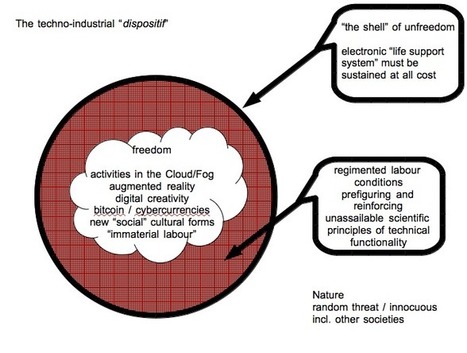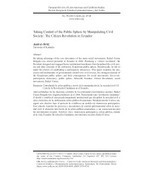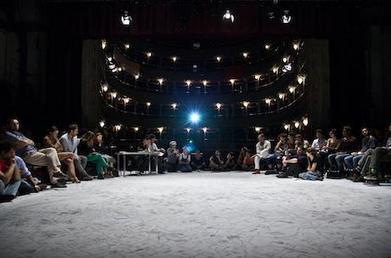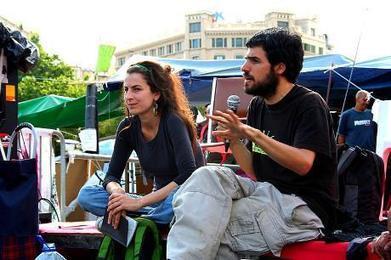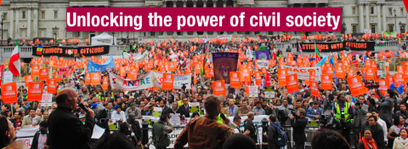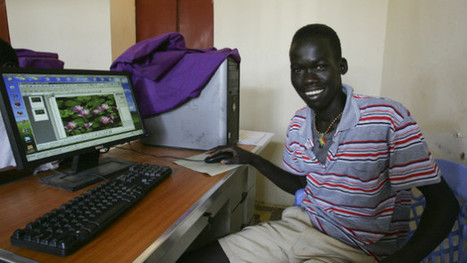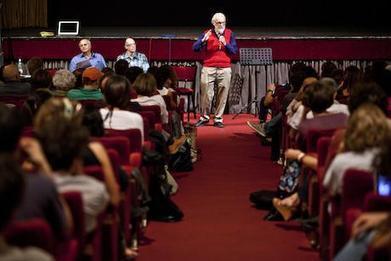 Your new post is loading...
structural challenges to technological emancipation: socially necessary discipline The interplay between discipline and freedom, how the former generates the latter and the latter requires the form…
Political leadership lies at the heart of
our modern democratic system. The real challenge for networked organizations is in working with, rather than against, this vital fact.
"Nick Dyer-Witheford (2007) has proposed the term Commonism for a society where the basic social form of production are the Commons (while in capitalism, commodities are the basic social form). As the success of commons-based peer production shows, commons and peer production go together very well. We can therefore expect peer production to be the typical form of production in a commons-based society. Commonism would be a society where production is organized by people who cooperate voluntarily and on an equal footing for the benefit of all.
By taking advantage of the core discourses of the main social movements, Rafael Correa Delgado was elected president of Ecuador in 2006. Promising a 'citizen revolution', the President designed...
An emerging relationship between the state and a commons-based civil society is starting to challenge the narrow thinking of the UK’s main political parties
"If Oakeshott is correct in identifying the absence of overwhelming concentrations of power as the essence of liberty, how can we account for the peculiar character of the state in Britain? According to Oakeshott, modern European states can best be understood as torn between two contradictory methods of association which are the legacy of the medieval age. The first mode of association he calls `civil association' and the second `enterprise' or `purposive association'.
FLOK stands for “Free, Libre, Open Knowledge,” and the FLOK Society is a government-sponsored project to imagine how Ecuador might make a strategic transition to a workable post-capitalist knowledge economy.
In BriefCivil society organizations (CSOs) have a crucial role to play in catalyzing transformative change, yet new ideas and strategies are needed to address the global crises we face. Their current pragmatism means that while they may win many battles, they are losing the war. CSOs should develop and put into practice strategies that embrace the cultural and systemic root causes and learn new ways to influence the political and social systems.
Last Saturday, famed economist and political advisor Jeremy Rifkin was featured in the New York Times in an op-ed entitled “The Rise of Anti-Capitalism.” In it, he predicts that the nonprofit sector will become increasingly important in the world’s economic future as more and more of the way we do business is based on networks and automation and the “Internet of things.” In all of this, he says, the capitalist market will become a “niche player,” providing networking platforms in an increasingly collaborative economy.
‘European citizenship’ is a ‘constituent’ process that emerges, develops and is constantly elaborated within social practices. How does the practice of the commons effect it? This week’s guest feature reports back on an experiment conducted last September in Teatro Valle.
The precariat, a class-in-the-making, is the first mass class in history that has systematically been losing rights built up for citizens. So, why is it thenew dangerous class and how is it differentiated from other class groups in the evolving global labour process?
‘If representative democracy is only to choose every four, or five, or six years the person who’s going to do everything they want without taking popular will into account... we are in a sort of trap and I think that’s certainly the case today for Europe and elsewhere.’
Democracy is lost unless we re-structure our economies, and re-structuring our economies requires a new system based on different values. This is the sixth article in our series on empathy and transformation.
|
How Bolivia is asserting its political and economic independence by setting up an entirely homemade Internet network.
“New technologies are leading to an exponential increase in the volume and types of data available, creating unprecedented possibilities for informing and transforming society and protecting the environment. Governments, companies, researchers and citizen groups are in a ferment of experimentation, innovation and adaptation to the new world of data, a world in which data are bigger, faster and more detailed than ever before. This is the data revolution.” – UN Data Revolution Group, 2014 - See more at: http://blog.okfn.org/2015/07/09/democratising-the-data-revolution/?__scoop_post=4cc5a360-2678-11e5-8903-90b11c3ead14&__scoop_topic=429019#__scoop_post=4cc5a360-2678-11e5-8903-90b11c3ead14&__scoop_topic=429019
Yesterday dmf linked an article here titled “Internet privacy, funded by spooks”, which advances the argument that through a series of intermediary organizations, federal money has been subsidizing the creation of whistleblower technologies and...
A young man at a Mercy Corps Civil Society Resource Center, which offers computer training, Internet access and a meeting space for civil society organizations in Sudan.
"Rodrigo Davies has thought a lot about civic crowdfunding, first as an adviser to Spacehive, then as an MS student at MIT and, now, as a PhD student in the Work, Technology and Organizations group at Stanford University. Davies is currently on leave from his doctoral research and working as Head of Product at Neighbor.ly, where he is helping build a platform that will allow community members to invest in their cities by purchasing municipal bonds." (http://www.shareable.net/blog/civic-crowdfunding-and-the-public-good)
There’s been tremendous energy behind the movement to change the way that local governments use technology to better connect with residents. Civic hackers, Code for America Fellows, concerned residents, and offices such as ours, the Mayor’s Office of New Urban Mechanics in Boston, are working together to create a more collaborative environment in which these various players can develop new kinds of solutions to urban challenges. In many cities, you can now find out via text message when your bus is coming, taking uncertainty out of your commute. With StreetBump, your phone can report rough stretches of road to the City automatically as you drive over them. Data policies have made available an unprecedented volume of information on safety, health and other pressing urban issues. We often talk about strengthening the relationshipbetween citizen and government; these innovations are pointing in that direction and, hopefully, building trust between the public and their local governments.
Use of the internet has not led to a predominance of virtual actions and movements over mobilizations in ‘physical space’. On the contrary, since 2011 the occupation of urban public spaces - and more particularly symbolic spaces - has been a major feature of these movements.
A cursory glance at the comment section of the UK's leading newspapers suggests that democratic engagement is at an all time low; we are generation apathetic. In their annual health check, the Audit of Political Engagement, the Hansard Society paint a bleak picture of participation trends in Britain. Only 41% of those surveyed are committed to voting in the next General Election. Moreover, less than 1% of the population is a member of a political party. However, 38 Degrees, the political activist movement, bucks these downward trends. In the four years since their foundation in 2009, 38 Degrees have amassed a membership of 1.8 million individuals—more than three times the entire combined memberships of all of Britain’s political parties.
"The common good is a term that can refer to several different concepts. In the popular meaning, the common good describes a specific "good" that is shared and beneficial for all (or most) members of a given community. This is also how the common good is broadly defined in philosophy, ethics, and political science. This concept is increasing in popularity as moral vision for the progressive left in American politics."
In a precarious context induced by a struggle for the essential, one term has re-emerged as indispensable, providing many of us with a new sense of direction, creation and sharing, and ultimately, like a boomerang, assuming the ‘austere’ dignity of that which cannot be renounced: the commons.
Just as voting participation rates have fallen over the last 40 years, civic engagement is on the decline in the United States, too. But there is some hope for a turnaround, says Peter Levine in his new book, We Are the Ones We Have Been Waiting For: The Promise of Civic Renewal in America (Oxford University Press), in which he offers explanations about why so few people are involved in their communities, provides examples where activism has worked and suggests some idealistic goals.
Read more at: http://phys.org/news/2014-01-reviving-spirit-democracy.html#jCp
In the struggle for social justice it’s not how much empathy we feel that makes the difference, but what we do with it in concrete situations. This is the third in our series of articles about empathy and transformation.
|
 Your new post is loading...
Your new post is loading...





